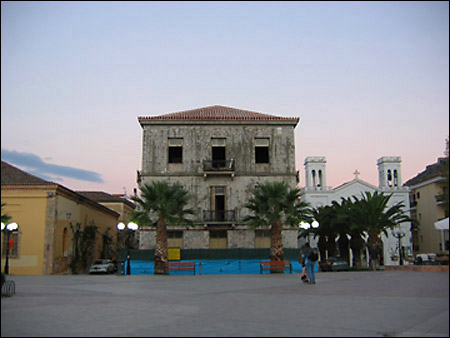Hellenic Studies opens office in Greece
Nafplion office is open to faculty and graduate, professional students
For close to a half-century, Harvard University’s Center for Hellenic Studies (CHS) in Washington, D.C., has sponsored conferences and publications and hosted research fellows from all over the world. In September, the center officially opened its first branch overseas – an office in Nafplion, a Greek seacoast city that dates to the Bronze Age.

The office was authorized in September by the provost of the University, but it is not meant to match the scale of Harvard’s Villa I Tatti in Florence or other similarly large centers of international scholarship. “It will not be a massive Harvard presence,” said Jay Taft, an associate dean with the Faculty of Arts and Sciences. He compared the new operation to the office in Santiago, Chile, operated by the David Rockefeller Center of Latin American Studies.
Harvard’s newest international presence is part of a continuing endeavor at the University to open up the world to undergraduates, graduate and professional school students, and professors. The goal became explicit in spring 2002 when the University approved a plan to expand opportunities for international studies, travel, and scholarship abroad.
Jorge I. Domínguez, the vice provost for international affairs, a position created this past May, called the Nafplion office “part of the ongoing effort to engage Harvard in different parts of the world.”
Although the office was just officially authorized, there has been a touch of Crimson in the ancient city for three years. Renovations started in 2003, shrouding a neoclassical former town hall in scaffolding since then. (The structure, with its tile roof and stone walls, still awaits a coat of ochre plaster.) Last summer, six undergraduates were in Nafplion to explore Harvard’s first internship program in Greece. Said Genevieve Uzamere ’07, “I was able to travel in Greece in a way few tourists are able to.” The program, including a stipend for travel, is available again in 2007. (E-mail summer_internships@chs.harvard.edu for more information.)
The Nafplion office is now open to interested faculty, as well as to graduate and professional students. CHS will also work with Harvard’s Office of International Programs to inform and recruit undergraduates for learning programs in Greece. University officials envision cooperative programs in Nafplion with other Harvard entities that either have or plan activities in Greece, including the Harvard Medical School, the Harvard School of Public Health, and the Kennedy School of Government.
Nafplion, with its warren of ancient winding streets, is on the rugged Peloponnese Peninsula, two and a half hours southwest of Athens. The site carries immense symbolic weight, said CHS director Gregory Nagy, the Francis Jones Professor of Classical Greek Literature on the Harvard campus. Nafplion was the first capital of the modern Greek state in 1821, during a hard-fought rebellion against the Ottoman Empire. It was also the seaport of the Mycenaean empire, a crossroads of Hellenic culture two millennia before Christ. “This place symbolizes the continuity of Hellenic politismos, in all its beautiful variations, for almost 4,000 years,” said Nagy. (Politismos has more resonance in Greek, but the term roughly means language and culture.)
The modern and the ancient still intersect in Nafplion. “It’s an ideal place for experiencing an immersion in Greek culture, and in European culture in general,” said Jennifer Reilly, a CHS programs officer who is one of two Harvard staffers at the office. (The other is former classics concentrator Christine Kim ’06.) By next year, said Reilly, high-speed rail will cut the Athens-Nafplion trip to 90 minutes, drawing modernity even closer to the old city. Nafplion is also near 10 major archaeological sites, including Corinth, Olympia, and Sparta. Said Reilly, “It represents the full continuum of Greek civilization,” from the Bronze Age to modern times.
“Our goal is to showcase Greece,” said Reilly, who is fluent in modern and classical Greek. “It’s a place where the Harvard community can rediscover something about foreign cultures, and about Greek culture, in the cradle of civilization.”
Civilization at the Nafplion office – with its Mediterranean touches of tile, plaster, and wrought iron – will include the jarringly modern. Visitors will have full electronic access to CHS’s scholarly U.S. collections. Classes and conferences will take place in a first-floor video-conferencing room, slated for completion this fall.
Nagy, an expert in archaic Greek literature and oral poetics, is also a deep believer in distance learning and in using technology to enhance academic pursuits. With its specialized library and information technology, the CHS “is committed to give back all that it owes to Hellenism, which universalized the concept of humanism,” he said.
Nafplion is on the Anatolian Peninsula, the bridgelike region of Southwest Asia that lies between mainland Asia and Europe. In the ancient Mediterranean world, the old city and other Hellenic centers were central points of contact for a seminal brew of crisscrossing civilizations. Why not again? Nagy envisions Nafplion as a place for study “that transcends the distinctions between Europe and non-Europe.”




